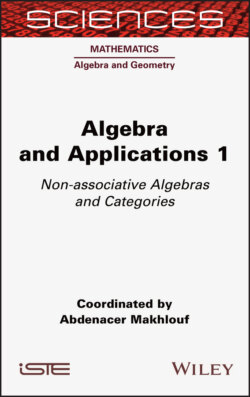Читать книгу Algebra and Applications 1 - Abdenacer Makhlouf - Страница 13
1.3. Basic examples (classical superalgebras)
ОглавлениеLet be an associative superalgebra. The new operation in the underlying vector space A given by:
defines a structure of a Jordan superalgebra on A that is denoted A(+).
DEFINITION 1.7.– Those Jordan superalgebras that can be obtained as subalgebras of a superalgebra A(+), with A an associative superalgebra, are called special. Superalgebras that are not special are called exceptional.
REMARK 1.2.– If we consider in the original associative superalgebra the new product given by:
we get a Lie superalgebra that is denoted as A(–).
DEFINITION 1.8.– A superalgebra A is simple if it does not have non-trivial graded ideals. A graded ideal is an ideal I ⊴ A such that for every a = a0 + a1 ∈ I, it follows that a0, a1 ∈ I. So every graded ideal I satisfies .
Wall (1963, 1964) proved that an arbitrary simple finite dimensional superalgebra over an algebraically closed field is isomorphic to one of the following two types:
1 I) .
2 II) .
Consequently, we can easily get the first examples of simple finite dimensional Jordan superalgebras as explained above.
EXAMPLE 1.8.– .
EXAMPLE 1.9.– J = Q(n)(+), n ≥ 2.
DEFINITION 1.9.– Let A be an associative superalgebra. A map ∗ : A → A is a superinvolution if it satisfies:
1 i) (a∗)∗ = a, ∀a ∈ A;
2 ii) .
If ∗ : A → A is a superinvolution of the associative superalgebra A, then the set of symmetric elements H(A, ∗) is a Jordan superalgebra of A(+). Similarly, the subspace of skew-symmetric elements K(A, ∗)= {a ∈ A | a∗ = –a} is a Lie subsuperalgebra of A(–).
The following two subsuperalgebras of are of this type.
EXAMPLE 1.10.– Let In, Imbe the identity matrices and let t be the transposition.
Let us denote .
Then U t = U–1 = –U, and ∗ : Mn+2m(F) → Mn+2m(F) given by
is a superinvolution.
The superalgebras
are the Lie and Jordan orthosymplectic superalgebras, respectively.
EXAMPLE 1.11.– The associative superalgebra Mn+n(F) has another superinvolution given by:
The Lie and Jordan superalgebras (respectively) that consist of skew-symmetric and symmetric elements, respectively, are denoted as Pn(F) and JPn(F) (and are also called “strange series”).
EXAMPLE 1.12.– The three-dimensional Kaplansky superalgebra K3= Fe + (Fx + Fy) with multiplication table:
is a simple Jordan superalgebra. Note that K3 is not unital.
EXAMPLE 1.13.– The one-parametric family of four-dimensional superalgebras D(t) defined as D(t) = (Fe1+ Fe2) + (Fx + Fy) with the product
The superalgebra D(t) is simple if t ≠ 0. In the case t = –1, the superalgebra D(–1) is isomorphic to M1+1(F)(+).
EXAMPLE 1.14.– Let V be a vector space that is ℤ/2ℤ-graded, , and has a superform (|) : V × V → F, which is symmetric on , skew-symmetric in and . Then is a Jordan superalgebra, where the product of two arbitrary elements α1 + v and β1 + ω in J is given by
for arbitrary v, ω ∈ V.
We will refer to J as the superalgebra of a superform.
J is simple if and only if the form (|) is non-degenerate.
EXAMPLE 1.15.– Kac (1977a) introduced a 10-dimensional Jordan superalgebra J whose even part has dimension 6 and splits as the direct sum of a superalgebra of a superform and a one-dimensional algebra. Thus, has the multiplication given by:
and any other product of two basic elements is 0.
The odd part has a basis {x1, x2, y1, y2} and the following multiplication table:
Finally, the action of over is given by:
This superalgebra is simple if char F ≠ 3. In case of char F = 3, it has an ideal of dimension 9 that is spanned by e, vi, 1 ≤ i ≤ 4, xj, yj, 1 ≤ j ≤ 2. It is called degenerated Kac superalgebra and is denoted by K9.
In Medvedev and Zelmanov (1992), it is proved that the Kac superalgebra K10 is not a homomorphic image of a special Jordan superalgebra.
Benkart and Elduque (2002) realized K10 as the space of K3 ⊗ K3 + F1 (with a new product) where K3 is the Kaplansky superalgebra.
Another (octonionic) construction of K10 was suggested in Racine and Zelmanov (2015).
